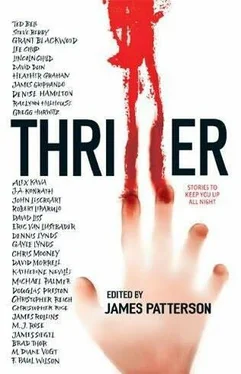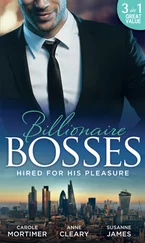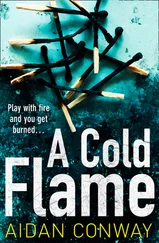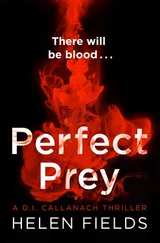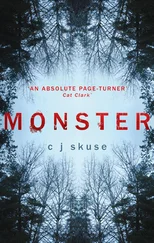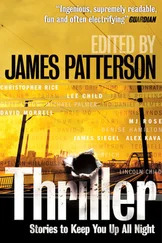"Your pistol is spent," he said. "Mine, however, is not." From his pocket he withdrew an imposing piece, which he aimed at my chest. "Sit." He gestured to my great and heavy chair.
Make no mistake, I had my wits about me. I saw no reason to lose heart, but with no choice but to obey, I sat. From his pockets he then withdrew a length of thick rope.
"Tie yourself to the chair," he said. "And no deception, if you please. I have my eye 'pon you, and I know a fine knot from a poor."
My hands fumbled with the rope. "Look here, Phillip. I have a great deal of money about me, and rather than be enemies, let's come to what they call an understanding."
He said nothing until I had secured myself tight to the chair. I meant to create a loose knot, but his eyes never left me. I must now operate under the belief that he could not kill me in cold blood- and that I could buy my freedom with the promise of silver.
Once I was bound, he smiled at me, a devilish sort of smile. "My name is not Phillip," he said to me. "I presume you did not see my face when you knocked me down a year and a half ago, and so it is you who do not recognize me today."
A sort of stillness overtook the room. It was the stillness that came over the theater when a great revelation was made. Even the rabble of the pits would pause in their nonsense to look up and see what secrets were being said. Here it was, in my life, such a moment. A moment of the theater as things that had been hidden revealed themselves.
"Thomas Lane," I said. "I thought you was dead."
"No, Thomas did not die, though I am not he. You mistook the one for the other, as you were meant. I am Benjamin Weaver."
"Then, the man I knocked down…" I began.
"That was me who you mistook for Thomas Lane during our last encounter. Thomas had some unfortunate bounties upon him, and he thought it useful to let the world believe he died by your hand. It was therefore spread about that you had killed him, and to give the story the credibility Thomas required, it was also spread that I sought revenge for a death that never was."
I began to sputter, for now this story was all confusion. "If I did not kill Lane, why all the trouble to take revenge upon me?"
He smiled again. "It is not revenge, Fisher. It is a matter of business, as I have found a better way to earn my bread. I am no longer a man of the highway, but a thief-taker. The owner of this box employed me to retrieve it. As you would tell no one, not your closest confederates, where you kept your goods, I had no choice but to encourage you to bring me to it of your own free will. Your attempt to rob us 'pon the highway was my scheme. I permitted you to believe you manipulated me, when I was the one who manipulated you."
"You're nothing but a double dealer, and a more ruthless bastard than ever I was," I told him. "You let all those people die so that you could retrieve this box?"
He laughed. "No one has died. No one has been hurt. Did you not wonder how you missed me when you fired 'pon me? Your companion neglected to include balls in the pistols. We deceived you with empty firearms and false blood from the stage."
It was then, over the stench from the discharged pistol, that I began to smell something else. A stench like rotted eggs-and rotted meat and rotted teeth. Then, into the room walks Farting Dan, Thomas Lane by his side.
"I knew you had the box in your rooms," Farting Dan announces, "but as you would tell no one where your rooms were, I could not sell that information. I knew the way you'd have to pass, though, so Thomas and I rode ahead of you and waited for you to glide by. You were so intent in getting home, so certain you were now safe, you did not notice us behind you."
"You've betrayed me," I shouted at Farting Dan. "Why?"
"For money," he said with a shrug.
"It's a good reason," I answered, "and I'll not fault you for it."
"Now," Dan says to Weaver, "take the box and be off with ye. That was our bargain, and I expect you'll honor it."
Weaver nodded. "I should like to bring you to justice, Fisher, but I will honor my word. You'd be wise not to cross my path in the future, however."
And so it was that he lifted the box in his arms, and he and his companion left my rooms.
In silence we waited as we heard their heavy steps down the stairs, then the slam of the front door. Farting Dan went to the window and watched for some minutes, and I watched him. Then at last he turned to me and broke the silence. "Not too tight, I hope, them ropes?"
"I done it myself," I says.
"You comfortable?" he asks.
"Shut your gob and untie me," I says. "You get the last payment?" He cut through the ropes with his knife. "Ten more guineas, as promised."
With my hands free, I stood and rubbed my wrists. "A lot of nonsense for twenty guineas," I says. "Particularly since the contents of that box must be worth a hundred times that."
"Twenty guineas is better than nothing, which is what the box was worth to us if we couldn't get it open. And we got it without fear of a hanging, or having to do business with a fence. Not bad in my thinking."
He was right, too. That Farting Dan was a practical fellow, and a clever one. I'd have never thought of this plan on my own. But that was Dan. Always thinking. And always farting.
As a deputy U.S. marshal tasked with transporting inmates and hunting down fugitives, Gregg Hurwitz's protagonist, Tim Rackley, finds himself in and around prisons on a daily basis. The Kill Clause, Rackley's first thriller, begins with Rackley learning about his seven-year-old daughter's murder. From there, he's drawn into a shadowy commission of men seeking justice outside the law. The Program brought Rack-ley inside a deadly mind control cult, when he was tasked with retrieving the missing daughter of a powerful Hollywood producer. For research, Hurwitz went undercover into mind control cults and submitted himself to cult testing.
Troubleshooter, the next Rackley thriller, opens with the leader of an outlaw biker gang pulling off a daring freeway escape while being driven from sentencing to prison. Clearly, the Rackley series grapples with issues of vigilantism-justice versus the law-each book offering Rackley's ever-evolving perspective. In the course of researching each of the Tim Rackley books, Hurwitz himself spent time behind bars, getting to know the men and women who keep the prisons running.
Dirty Weather was inspired by them.
He was handsome in a dirty sort of way, lank hair shoved back over his ears, muscles firm beneath a white button-up shirt he wore untucked with the sleeves cuffed past the forearms. He'd slipped into Frankie's Furlough quietly, a swirl of biting wind from the still-closing door conveying him to the far end of the bar. The rickety building stuck out from a snowdrift off the interstate as if hurled there. The interior smelled of sawdust, which layered the floor, soaking up spilled booze and the melted sludge of tracked-in earth.
Home to truckers, twelve-steppers who'd fallen off the staircase, and most often, correctional officers, the Furlough had been something of a roadside institution ever since Frankie had taken his pension from the big house and parlayed it into four walls, a roof of questionable efficacy and a red-felt pool table. He'd done well for himself, too, though it wasn't apparent from the looks of the place.
The surrounding landscape had been stripped bare by winter, trees thrusting like forked sticks out of gray rises of snow. Few signs of life persisted in the stretch of Michigan freeze: a liquor store across the frontage road, a long-closed diesel station, a sloped gravel turnoff for runaway semis. And then a stark ten-mile crawl north to the only employer of significance in the county, the Upper Ridgeway State Men's Correctional Facility, which rose from behind a stark shelf of white cedars like a secret no one had bothered to keep secret.
Читать дальше
